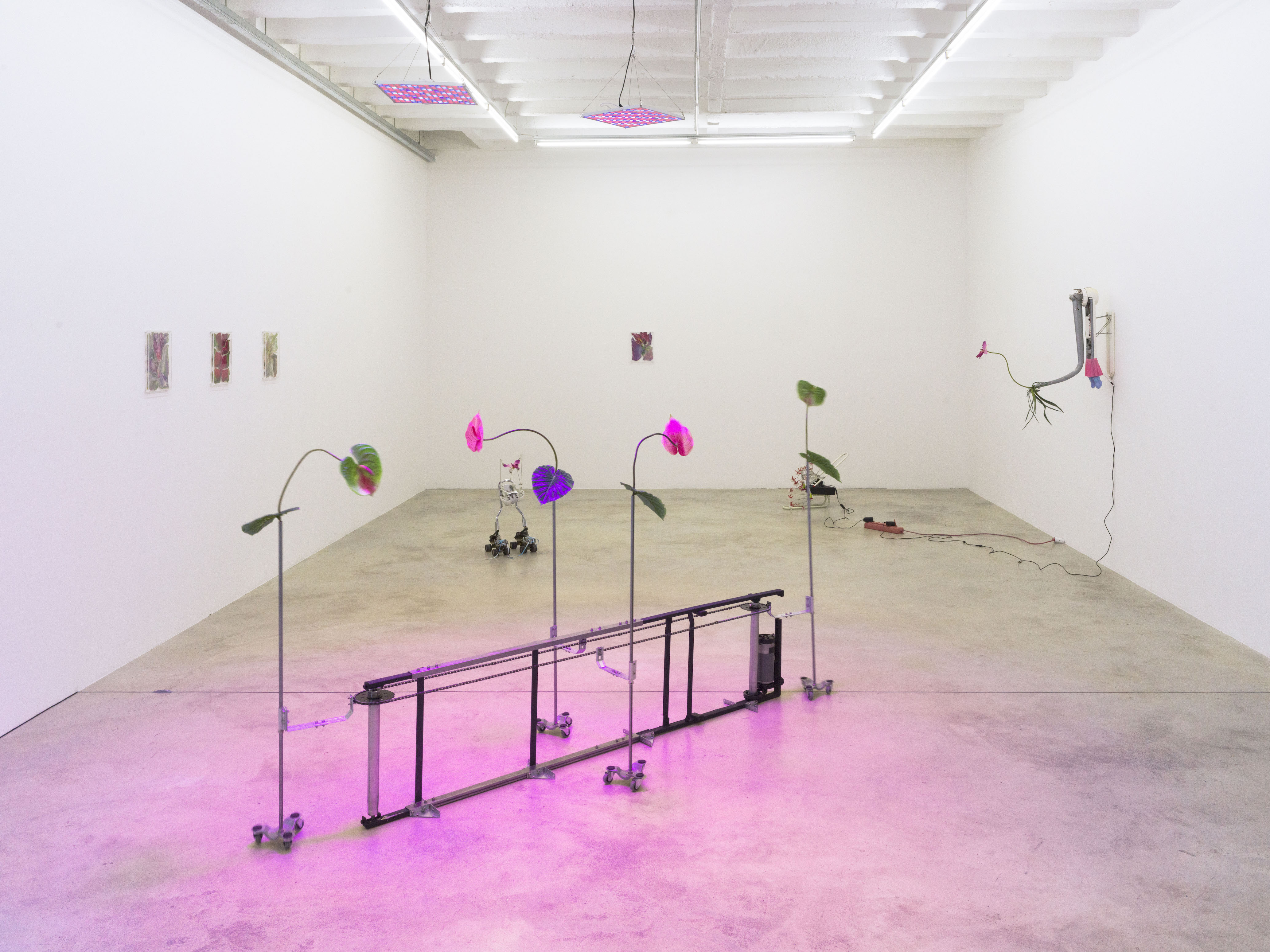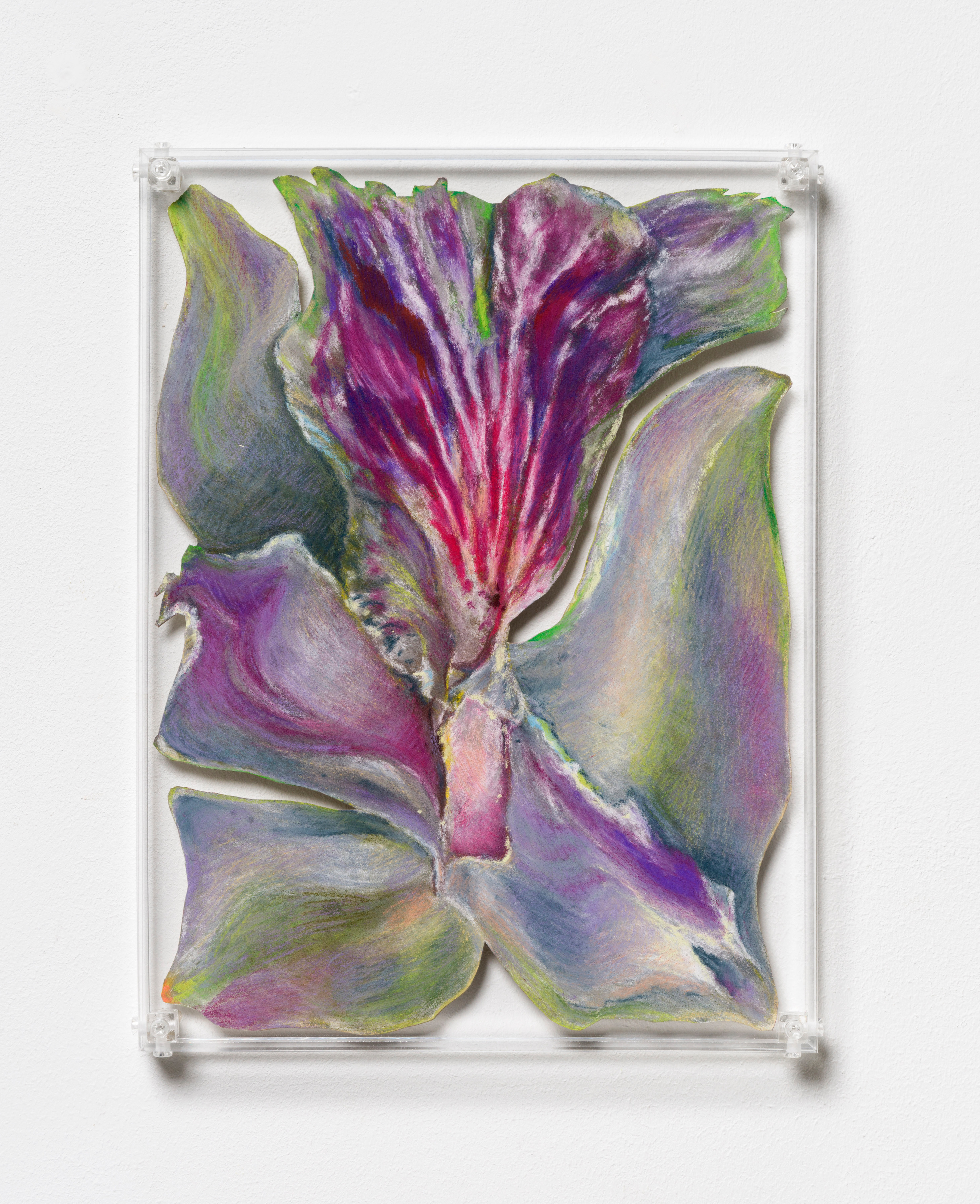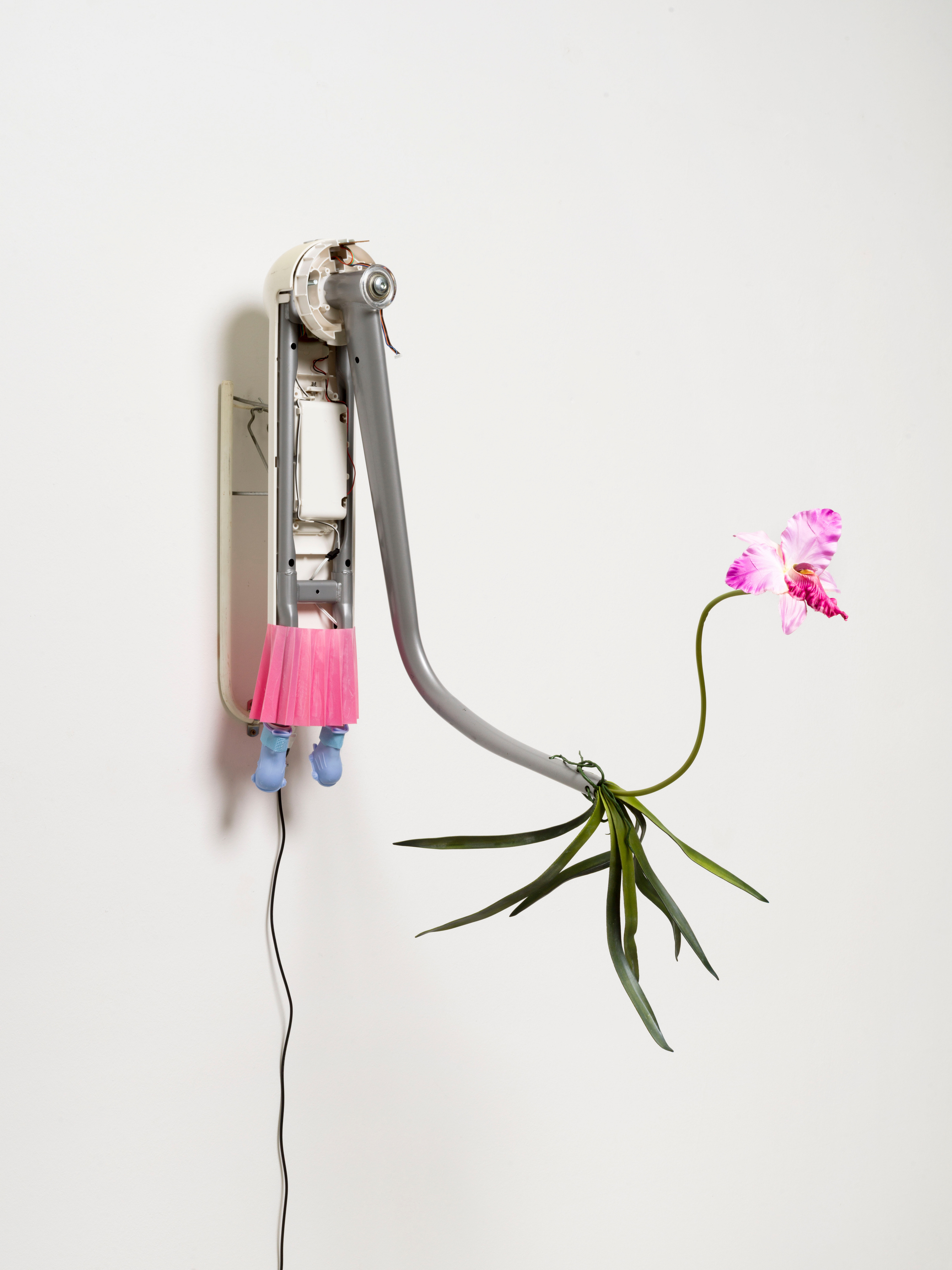Shows
Rachel Youn’s “Pleasure Circuit”

Rachel Youn
Pleasure Circuit
Soy Capitan Berlin
Sep 11–Oct 26, 2024
Repetition breaks the spirit, even for fake flowers. At least, this was the case in Rachel Youn’s solo exhibition “Pleasure Circuit,” at the Berlin-based gallery Soy Capitan, which brought together five of Youn’s new kinetic sculptures and a series of previously unseen flower drawings, posing questions about the desire economy and our relationship to objects that are made to optimize domestic life. The exhibited sculptures were composed of fake flowers and discarded electrical home devices that the artist sourced in the months leading up to the exhibition’s opening during Berlin Art Week in mid-September, drawing from flea markets and second-hand online platforms. In this sense, the exhibition served as a visual reflection of domestic life in Berlin, revealing the inner makings of gendered labor, patriarchal power structures, and the relationship between human bodies and machines.
The centerpiece of the exhibition, the large-scale installation Plus ça change (“the more it changes”) (2024) was composed of a discarded walking pad encircled by pink artificial flowers on long stems, which perpetually swirled in a continuous dance. Overhead, plant lamps on the ceiling cast a violet glow onto the installation and throughout the gallery space, creating a common visual thread that tied the exhibition together. Using plant lights as a substitute for sunlight epitomizes humanity’s attempt to control organic growth while neglecting or suppressing natural cycles. Their artificiality also emphasized the symbolism of Youn’s signature fake flowers, which evoke a ceaseless, unnatural vitality through their incessant state of bloom.

RACHEL YOUN, Well adjusted (Sobralia), 2024, pastel on pastel card, acrylic, 32 × 24 × 2 cm. Photo by Roman Marz. Courtesy the artist and Soy Capitan, Berlin.
Taken as a whole, Plus ça change reflects society’s fixation on eternal youth, particularly in relation to women’s bodies, for which flowers are often used as a symbol. In the drawing series Well Adjusted (2024), Youn continued to explore this historical symbolism by engaging with the tradition of flower painting. Six vibrant pastel drawings of various floral specimens—orchids, magnolias, and heliconia—roughly the size of a magazine cover, focus on the flower, neglecting depictions of its leaves or stems, reminiscent of biological diagrams that illustrate the exact growth and color palette of a specific specimen. Although in Youn’s case, the flowers appear compressed within the confines of these frames, as though straining to break free.
While the flowers in her drawings and installation connote life, Youn’s kinetic sculpture Thanatos (2024) references the eponymous personification of death in Greek mythology. Here, the artist interpreted Thanatos as a bread-slicing machine—an authentic symbol of female domesticity that Youn found in a flea market—complete with a moving, round metal knife sitting on top of the kitchen tool’s pastel-yellow and orange plastic body. Attached to the moving knife was a chain of silver wire with pink-tinged flower petals and leaves made of delicate glass fixed to it. As the chain is drawn over the plastic surface again and again, it creates perpetual microfissures which will ultimately cause the glass to disintegrate. Despite its initially playful aura, then, the work suggested an undercurrent of hidden violence, amplified by the relentless sound of metal and glass scraping and scratching over plastic.

RACHEL YOUN, Leah, 2024, disassembled baby swing, hardware, fake plant, folding fan leaf, dog shoes, 102 × 98 × 63 cm. Photo by Roman Marz. Courtesy the artist and Soy Capitan, Berlin.
Similar condemnations of “women’s work” could be seen in the wall-mounted sculpture Leah (2024), constructed from the inner machinery of a baby swing and a pink fake orchid. The baby swing was in constant motion, simulating the movement of caring and soothing arms rocking an infant to sleep. This mechanical, repetitive swinging movement, along with caressing a small child when it cries and being physically present fulfills a newborn’s basic need for bonding. A mechanized baby swing, however, outsources this basic and natural interaction to machinery, much like how plant lamps provide faux sunlight. The work’s title further questions the role of a caregiver: the biblical story of Leah, the prophet Jacob’s first wife, lauds her for giving birth to multiple sons and fulfilling her purpose as a woman in Judeo-Christian society. By invoking this story in a work that aims to question the role of “mother,” Youn recalls longstanding patriarchal norms and narratives which continue to oppress women.
The German cultural historian Evke Rulffes has theorized the “invention of the housewife” as a pillar of patriarchy designed to normalize unpaid housework performed by women, including repetitive daily tasks and maintenance work. Through the exhibited works, Youn used this characteristic repetition, which is especially apparent in household machines, to question our relationship to the objects (or objectified people) that perform explicit tasks for us, as well as how we engage with them after they have ceased satisfying our needs. “Pleasure Circuit” thus provided a darkly humorous reflection of contemporary society, which often equates how to define the value of human life with how to determine the worth of machines: upon their functionality.
Nora Wölfing is an art historian and sinologist who works as a curator, writer, and researcher specialized in contemporary art from China.







